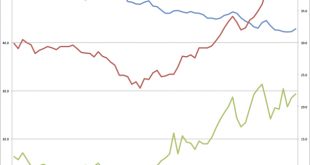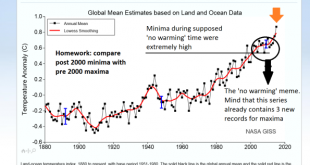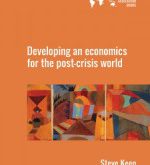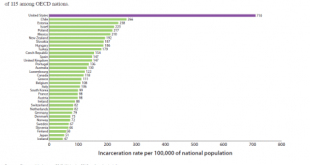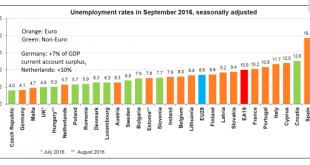from Maria Alejandra Madi The huge growth of deregulated finance has been associated to a new financial regime and great transformations in the pattern of economic growth. Looking back, there has been a narrow relationship between the crisis of the post-war accumulation pattern, the evolution of the international monetary system and the process of financial deregulation. In fact, as Bello (2006) warned, in the 1980s, Reaganism and structural adjustment were not successful attempts to...
Read More »James Meade Redux
from Peter Radford Well, that was fun. A rebellion has swept away the establishment. I never thought I would say that the rebellion would be manifested within the GOP and that the establishment would be within the Democrats, but that’s what we just witnessed. We on the left must accept that whatever we were saying just didn’t resonate with enough people. The Democrat’s obsession with identity politics that allowed it to ignore the consequences of its embrace of neoliberal economics has...
Read More »Monopsony, the labor market, and inequality
from David Ruccio For decades now, the labor share of U.S. national income (the blue line measured on the left-hand vertical axis in the chart above) has steadily declined, while the shares of income and wealth captured by the top 1 percent (the red and green lines on the right-hand axis) has increased. And in recent years, even as employment has mostly recovered from the Second Great Depression, the wages paid to the majority of workers have continued to stagnate (even while incomes...
Read More »Polling and nonergodic stochastic processes
The latest polls showing Clinton would win the presidential election is more evidence to support my argument that trying to predict human behavior — whether it involves economic decision making or politics decision making — involves dealing with a nonergodic stochastic process. Pollsters believe that if you take a RANDOM SAMPLE OF THE VOTING POPULATION ON DAY X BEFORE THE ELECTION and calculate the probability distribution of voting for the various candidates, then this x day before...
Read More »Global warming: bet on it
I guess it is time to publish this graph, from the USA NASA.gov site. My prediction: this series will soon be discontinued. I did add some text, as grading has tought me that even intelligent people often have difficulties with the interpretation of graphs. My interpretation: the ‘no warming’ meme, which has been quite influential in climate denial circles, is and Always has been bonkers and climate change is progressing faster than expected. But are these deniers really stupid, or bad at...
Read More »Economic Depression: A commentary on Paul Romer’s The Trouble With Macroeconomics
By David Orrell In a previous article for this newsletter, I wrote about the rather long and withdrawn grief process that the economics profession is working through, as it comes to terms with its role in what has become known as the Great Financial Crisis. Initial denial was followed by anger towards critics, which in turn was followed by a bargaining stage. The latter (I used Dani Rodrik’s book Economics Rules as an example) involved claims that there is nothing seriously wrong with...
Read More »There are two price levels in capitalism
One essential aspect of Minsky’s Financial Instability Hypothesis was the argument that there are two price levels in capitalism: consumer prices, which are largely set by a markup on the costs of production, and asset prices, which are determined by expectations and leverage. This argument originated with Keynes in Chapter 17 of the General Theory, when he noted that investment is motivated by the desire to produce “those assets of which the normal supply-price is less than the demand...
Read More »Crime, starvation and incarceration in America (2 charts)
Subject to an unregulated free market for labor, Polanyi believed that “workers would die as the victims of acute social dislocation through vice, perversion, crime, and starvation”. The US has the most “flexible” labor market of all OECD countries, meaning the freest market for labor, with the least intervention by government or social institutions, as defined by Polanyi. “Essentially, to get high ratings, a country must have low marginal tax rates, a low minimum wage, a high degree of...
Read More »The libertarian case against TrumpKKK – I’m waiting
Deirdere McCloskey should be freaking out. A man called Trump threatens her world. McCloskey is not just the most eloquent but also the most thorough defender of the idea that ‘the bourgeois ethic’ and bourgeois virtues were crucial to the unprecedented prosperity of modern men and women – and improved our ethical standards in the process: “Give masses of ordinary people equality before the law and equality of social dignity, and leave them alone, and it turns out that they become...
Read More »Euro economies: still out of kilter
According to Eurostat, unemployment differences in the EU are still large (graph). Especially the euro countries do bad. The Netherlands and Germany seem to buck this trend but this must be ascribed to whopping surpluses on their current accounts. As not all countries can, by definition, run current account surpluses at the same time (my surplus is your deficit) this means that total domestic demand in the Euro Area is way to low. Another option: people are working too much and have to...
Read More » Real-World Economics Review
Real-World Economics Review

